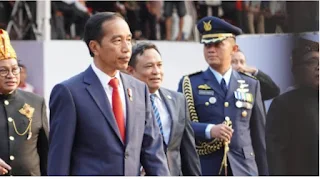On February 14, Indonesia will choose a new president. With pressure mounting on Indonesia's democracy, all eyes are focused on the election. However, given that leading contenders appear destined to maintain current policies—and that the president's son might potentially run for vice president—change may be hard to come by.
Indonesia will host the largest election ever held in a single day on February 14, 2024. There will be elections for a new president by more than 200 million Indonesians, as well as for the national parliament's two houses, local legislatures, and province governors. The presidential election, which will decide who will succeed current President Joko Widodo (sometimes abbreviated as Jokowi), is particularly significant. Jokowi is prohibited by the constitution from seeking office again after serving two terms of five years each.
However, Jokowi’s political maneuver to lift his politically quite inexperienced son Gibran to the vice presidency is both questionable and damaging to Indonesia’s fragile democracy. The Constitutional Court’s decision to allow Gibran to run despite being younger than the minimum age of 40 was largely made by Jokowi’s brother-in-law, Constitutional Court Chairman Anwar Usman. A few weeks later, the Ethics Council of the Constitutional Court ordered the removal of Anwar Usman from his leadership post and banned him from participating in electoral matters. He was found guilty of a “serious ethical breach” when he used his position to pave the way for the candidacy of Gibran. However, the questionable decision remained in force.
Family dynasties are a bad feature for any democracy because they contradict the principle of equality. Jokowi’s dynastic intentions are further exacerbated by the fact that he also sent his second son, 29-year-old Kaesang Pangarep, into politics. Two days after he joined the Indonesian Solidarity Party without any previous political experience, he was elected as the new party chairman.
During the election campaign, Jokowi has said several times that it would be better and cheaper for the country if there were only one round of voting, meaning that one candidate receives more than 50% of the votes in the first round of voting. Since the candidate pair Prabowo/Gibran, which is supported by Jokowi, is currently polling at around 40%, the government apparatus has launched numerous initiatives to score the missing percentage points in the first round of voting. There are clear signs that state funds are being used for the Prabowo/Gibran election campaign. In addition, the military, the police and the secret services, whose leadership is staffed by Jokowi’s confidants, do not appear to be neutral. State media and national/local government officials are also under pressure to support the incumbent president’s favorites.


Post a Comment